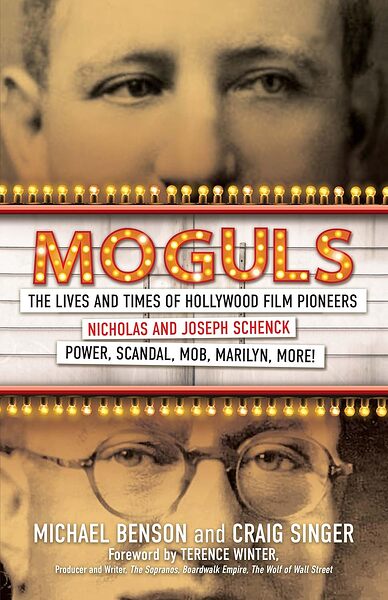Looking for a good read? Here is a recommendation. I have an unusual approach to reviewing books. I review books I feel merit a review. Each review is an opportunity to recommend a book. If I do not think a book is worth reading, I find another book to review. You do not have to agree with everything every author has written (I do not), but the fiction I review is entertaining (and often thought-provoking) and the non-fiction contain ideas worth reading.
Book Review
The Rise of Hollywood
Reviewed by Mark Lardas
October 20, 2024
“Moguls: The Lives and Times of Hollywood Film Pioneers Nicholas and Joseph Schenck,” by Michael Benson and Craig Singer, Citadel, September, 2024, 304 pages, $28.00 (Hardcover), $23.80 (E-book), $17.49 (audiobook), $45.95 (Audio CD)
Nicholas and Joseph Schenck were late-nineteenth century immigrants to the United States. Brought over as children to escape Czarist Russia’s anti-Semitic pogroms, their parents wanted them to be something in life – doctors, pharmacists. Instead they became film pioneers, eventually the two most powerful men in Hollywood.
“Moguls: The Lives and Times of Hollywood Film Pioneers Nicholas and Joseph Schenck,” by Michael Benson and Craig Singer, tells their story, and that of the film industry in the first half of the twentieth century. Largely forgotten today, the Schencks became the men who controlled Hollywood.
Benson and Singer restore their prominence in “Moguls.” The authors open with a multi-page list of the brothers’ firsts, significant accomplishments, and interesting facts. They created the Hollywood studio system, the Motion Picture Academy (and Oscars), and pioneered Technicolor. Some were less significant. Joe Schenck was Buster Keaton’s brother-in-law, and Joe joined the “mile-high club” early.
From there the authors move to the Schencks’ early lives. They show how the brothers grew up as secular Jews in 1890s New York City. They did become pharmacists, a stepping stone to becoming doctors. Their path to medical careers got sidetracked. Pharmacy then intertwined with entertainment (in the form of then-legal recreational drugs). The brothers discovered entertainment was an easier path to riches than pharmacy. They opened a saloon, then an amusement park, abandoning pharmacy.
Running family-friendly amusement parks proved more profitable than saloons. It also engaged them with newly-emerging cinema. Marcus Loew convinced them that adding length, plots, and storylines to the short “scenario” flickers of the time would draw in viewers – selling tickets. The brothers partnered with Loew. Between movies and amusement parks, the Schencks became entertainment tycoons, with Loew opening and running theaters.
Movies kept growing, along with the brothers’ fortunes. Benson and Singer show how movies crowded out other Schenck enterprises, even forcing Nick Schenck to give up his beloved Palisades Park. While Nick remained in New York, Joe went west, establishing Hollywood. Their influence grew with the movies. Even Jack Warner of Warner Brothers took orders from the Schencks.
“Moguls” is a delightful history. It presents a wild and wonderful story about the origins of the movie industry, and the unexpected directions in which it grew. It revels in the scandals, the eccentricities, and the glamor of the picture business. It offers an unvarnished look at Hollywood, its roots, and the colorful characters populating it.
Mark Lardas, an engineer, freelance writer, historian, and model-maker, lives in League City. His website is marklardas.com.
